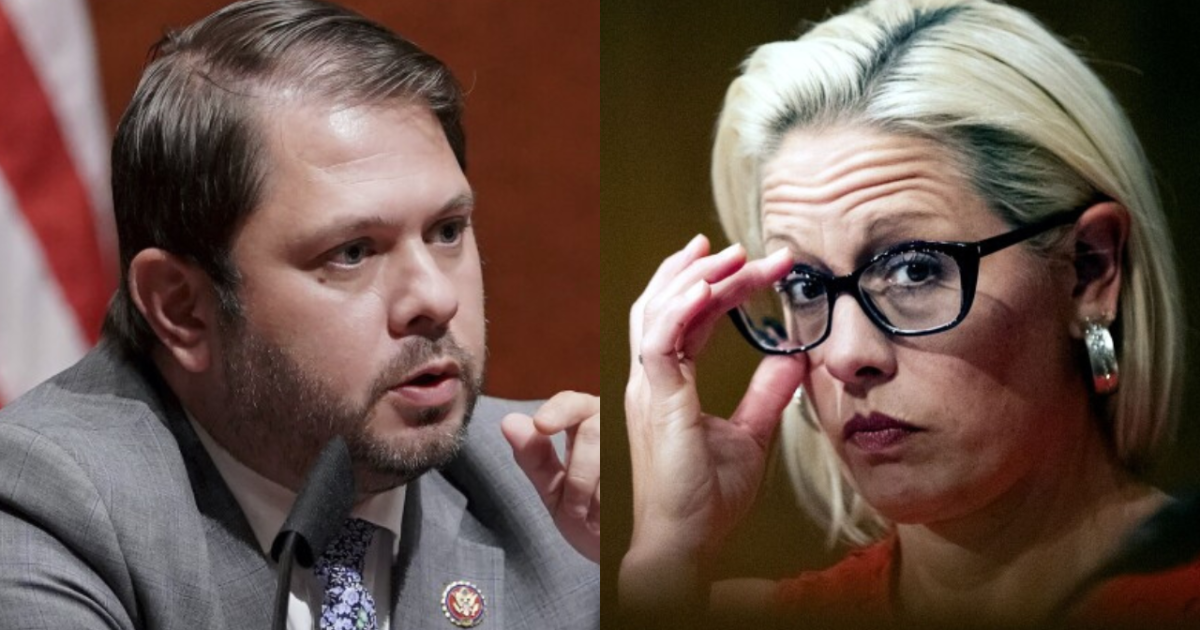

Last election cycle, enough competitive Senate races went Democrats’ way to give them a fragile 51-49 majority in the upper chamber. But the party is staring down a difficult electoral map for 2024, one that got even worse on Monday with Rep. Ruben Gallego’s (D-AZ) entrance into the Arizona Senate race.
His bid sets up what is expected to be a three-way contest between Gallego, the Republican nominee, and newly independent Sen. Kyrsten Sinema (I-AZ), assuming she decides to run. This prospect has the GOP optimistic, as Sinema, who left the Democratic Party in December, could siphon votes away from progressive challenger Gallego.
REP RUBEN GALLEGO ANNOUNCES RUN FOR KYRSTEN SINEMA’S SENATE SEAT
Democrats were already dealing with a 2024 headache, with nearly half of the Democratic caucus — 23 senators — up for reelection, several in states former President Donald Trump won in either 2016 or 2020.
Now, to save the seat, Democrats will feel inclined to back an independent incumbent even though she left the party abruptly after years of angering her colleagues by stalling the more progressive aspects of their agenda.
“This is absolutely a concern. The idea that two Democratic or Democratic-affiliated candidates with one running as an independent, both on the ballot at the same time, you know — that’s a real fear that they cannibalize each other’s votes,” said Jon Reinish, a Democratic strategist and former aide to Sen. Kirsten Gillibrand (D-NY).
“One has to evaluate very carefully if it’s worth tempting fate in such a way, where, best intentions aside, you end up having a very winnable race for either Sinema or, absolutely, for Gallego. You could end up handing an otherwise winnable Democratic seat to a Republican,” he added.
KYRSTEN SINEMA LEAVING DEMOCRATIC PARTY TO REGISTER AS INDEPENDENT
Gallego told Politico this week that fears his candidacy will split Democratic votes in the state are overblown.
“Let’s be clear about one thing: Sinema is not going to split the Democratic vote. She’s even more unpopular with Democrats than she is with Republicans and actually has a better chance of taking votes away from their side if they nominate another MAGA candidate, which they likely will,” he said.
For decades, Arizona was a Republican stronghold, but it has become more competitive in recent years. The last couple of statewide elections have been won by razor-thin margins by Democrats.
This past November, Sen. Mark Kelly (D-AZ) defeated Republican challenger Blake Masters by 4.9 percentage points. Sinema narrowly defeated Republican Martha McSally in 2018 by just over 38,000 votes and about 1.7 percentage points. The race took nearly a week to call. Independents and unaffiliated voters have tripled over the last 30 years to 1.4 million and make up about a third of the voting population.
Throughout Kelly’s most recent successful campaign, he catered to this key voting bloc by playing up his disagreements with President Joe Biden on immigration policy and casting himself in the mold of his predecessor, the late Sen. John McCain (R-AZ). For this reason, some Democrats in the state worry about how a progressive like Gallego will fare with the state’s electorate.
“Anyone who looks at our state and thinks it’s purple or even trending blue is seriously putting their head in the sand,” said a Democratic strategist in Arizona who weighed in anonymously to reflect candidly on the situation. “There were some extenuating circumstances in the last couple of elections that forced some Republican and independent voters over to our corner. While Sinema has been a thorn in the side of many Democrats, she’s the right kind of candidate to win in Arizona, and I worry a more progressive candidate will turn off voters.”
Other Democrats in the state feel differently and think the fifth-term House Democrat’s background as a veteran, and the fact that he will be running to become the state’s first Latino senator, could generate excitement among both Democrats and independents.
“It’s a potential risk given the makeup of Arizona, but I would again say he’s got plenty of time,” said Matt Grodsky, an Arizona Democratic strategist with Matters of State Strategies.
“He’s got energy and momentum, and he’s got time to build a coalition. I mean, I’m never gonna bet against a Latino in Arizona or Latino who was a Marine,” he added. “I think if he’s got enough of the business community, independents, stakeholders across the state, he could be formidable.”
Grodsky pointed out that if Sinema decides to run for reelection as an independent in the state, she’ll face a significantly higher signature threshold to get on the ballot.
“When you’re an independent, that’s substantially more signatures. So, Sinema has to get over 50,000 signatures to appear on the ballot. She’ll probably need to get something like 70,000 to have a healthy buffer. So, the real thing I’d be looking for, given the fact she has a year and a couple of months to make it on the ballot, does her campaign start making expenditures to get paid circulators out trying to get people to sign?” he said.
Senate Majority Leader Chuck Schumer (D-NY) declined to say whether he would back Sinema if she decides to run for reelection this week, but he praised her as an “excellent senator.”
“Look, Sen. Sinema is an excellent Congress member and Senate member, and she’s done a lot of good things here, but it’s much too early to make a decision,” he said during his weekly press conference when asked whether he would endorse the Arizona senator over a Democratic challenger.
Sen. Gary Peters (D-MI), who leads the Democratic Senatorial Campaign Committee, said they haven’t decided how to proceed with the race in Arizona and whether the committee will back the newly independent senator or a Democratic nominee.
“It’s still really early,” Peters told reporters this week.
In past races, the DSCC has backed independents who caucus with Democrats. They can also help boost independent candidates who caucus with them without an actual endorsement. In 2012, the campaign arm did not specifically endorse Sen. Angus King (I-ME), who caucuses with Democrats, but funded ads against Republican challenger Charlie Summers. The DSCC also supported independent candidate Al Gross in the Alaska Senate race in 2020.
“They all have made, what is for right now, a smart strategic calculation, which is to sit back and let this play out. I think the party does not want to be seen as placing their thumbs on any scales,” Reinish said. “These are smart, strategic, but also cautious and self-protective people. They have a slim majority to protect, and they have a really tough map in 2024. They are going to do what’s right, keeping that map in mind. They have, once again, literally no margin for error.”
Senate Republicans are watching from the sidelines, many coming out publicly to urge the Arizona senator to switch sides and caucus with them.
“Obviously, we’d love to have her become a Republican or at least caucus [with] Republicans. That would make things a little more clear,” said Sen. John Thune (R-SD), the minority whip.
Senate Minority Leader Mitch McConnell (R-KY) appeared to gloat this week, calling Gallego’s bid a “big dilemma” for Senate Democrats.
“Sen. Sinema has been an important part in the United States Senate. The most important thing she did was to save the institution itself by protecting the filibuster,” he said. “She’s also been a significant part of the bipartisan agreements that have been reached in the Senate.”
“As to whether or not she chooses to run again is really her decision, and I think it is a big dilemma for the Senate Democratic majority to decide whether to support her or to support somebody running on the Democratic ticket,” he added.
Even though the election is nearly two years away, Republicans see the situation unfolding in Arizona as a major opportunity.
CLICK HERE TO READ MORE FROM THE WASHINGTON EXAMINER
“The Democrat civil war is on in Arizona,” said Philip Letsou, a spokesman for the National Republican Senatorial Committee. “Chuck Schumer has a choice: Stand with open borders radical Ruben Gallego or back his incumbent, Sen. Kyrsten Sinema.”
Jon Seaton, a Republican political strategist and founding partner of the firm Camelback Strategy Group in Arizona, said the state could serve as a very promising pickup opportunity and could be a deciding factor in whether Republicans take back control of the Senate in 2024.
“Republicans really should pick up this seat. I guess the few unknowns so far are: Does Sinema end up running, and do Republicans nominate a candidate who can win statewide in Arizona? I think the dynamics of the race so far, at the outset, are very, very good for Republicans,” Seaton said.







